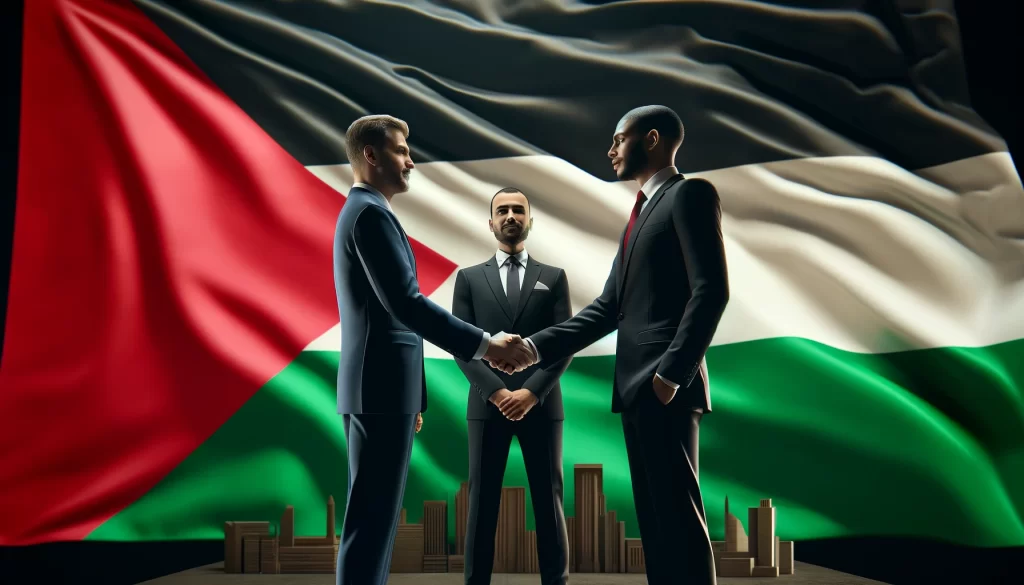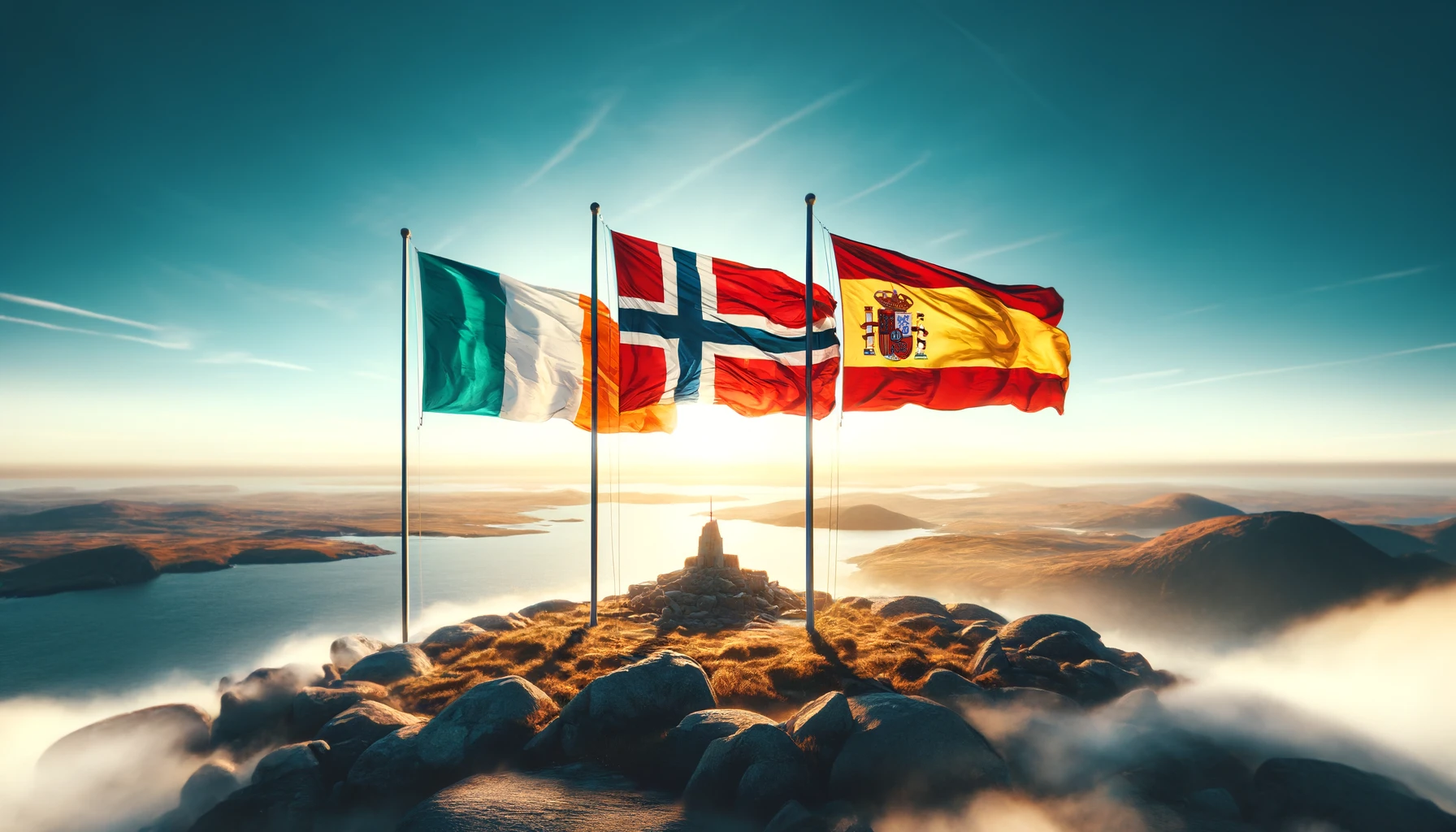On May 28, 2024, Ireland, Norway, and Spain will officially recognize the Palestinian state, marking a significant diplomatic shift intended to bolster peace efforts in the Middle East. This decision has elicited strong reactions from various international actors, particularly Israel, which has expressed considerable disapproval.
Details of the Announcements
The announcements from the three European countries came on Wednesday as a concerted effort to influence international recognition of Palestinian statehood. Norway was the first to make the declaration, followed shortly by Ireland and Spain. Norwegian Prime Minister Jonas Gahr Støre emphasized that the recognition was a supportive gesture towards “moderate forces” in the prolonged Israeli-Palestinian conflict. He described the move as an investment in a two-state solution, the only viable political resolution, with borders based on pre-1967 lines and Jerusalem serving as the capital for both states.
Irish Prime Minister Simon Harris echoed this sentiment at a press conference, clarifying that the decision was neither against Israel nor in favor of Hamas. He reiterated Ireland’s support for Israel’s right to exist securely and peacefully alongside its neighbors. Harris emphasized that the move was to support a peaceful future for both Palestinians and Israelis, stating, “Hamas is not the Palestinian people.”
Spanish Prime Minister Pedro Sanchez highlighted the decision’s purpose in his speech to the lower house of the Spanish parliament. He asserted that the recognition was aimed at accelerating efforts to secure a ceasefire in Israel’s ongoing conflict with Hamas in Gaza. Sanchez hoped that this step would encourage other Western countries to follow suit, strengthening international efforts to impose a ceasefire and relaunch the political process for a peace agreement.
International Reactions and Diplomatic Fallout
Israel reacted strongly to the announcements, with Foreign Minister Israel Katz ordering the immediate return of Israeli ambassadors from the three countries for consultations. Katz warned of severe consequences and stated, “Israel will not be complacent against those who undermine its sovereignty and endanger its security.” Additionally, Katz announced that the ambassadors of Ireland, Norway, and Spain would be summoned for reprimand talks, where they would be shown a video depicting the abduction of female Israeli soldiers on October 7, 2023.
The Palestinian Authority (PA) and Hamas both welcomed the recognition. The PA, which exercises limited self-rule in the Israeli-occupied West Bank, praised the move as a demonstration of unwavering commitment to delivering long-overdue justice to the Palestinian people. Hamas, which controls the Gaza Strip, described the announcements as a turning point in the international stance on the Palestinian issue, attributing the decision to the “brave resistance” of the Palestinian people.

European and Global Perspectives
The recognition by Ireland, Norway, and Spain adds to the growing list of countries supporting Palestinian statehood. Currently, 144 out of 193 United Nations member states recognize Palestine. However, before this announcement, only a few European Union members – primarily former Communist countries, Sweden, and Cyprus – had recognized Palestine. This latest development places additional pressure on other Western nations to reconsider their positions. Countries like Britain and Australia have indicated they might follow suit, with Malta and Slovenia also considering formal recognition.
Despite this trend, the United States and several major European powers remain opposed to recognizing Palestinian statehood outside of a negotiated settlement. The U.S. maintains that Palestinian statehood should emerge from direct negotiations with Israel. France and Germany share this position, with Germany calling for further dialogue and France indicating that the conditions for recognition have not yet been met.
Current Conflict and Humanitarian Concerns
The backdrop to this diplomatic maneuvering is the ongoing conflict between Israel and Hamas. The conflict intensified dramatically on October 7, 2023, when Hamas launched a surprise attack on Israel, resulting in the deaths of 1,200 Israelis and the abduction of over 250 hostages. In response, Israel launched extensive military operations in Gaza, leading to the deaths of over 35,000 Palestinians, according to the Hamas-run health ministry in Gaza.
The humanitarian situation in Gaza has continued to deteriorate amidst the conflict. The United Nations recently reported suspensions in food distribution in the southern Gaza city of Rafah due to supply shortages and insecurity. Efforts for a ceasefire and peace negotiations are ongoing, with long-running talks in Cairo currently stalled.
Implications for Israeli and Palestinian Relations
The decision by Ireland, Norway, and Spain to recognize Palestinian statehood has significant implications for the Israeli-Palestinian conflict. It marks a further step in Israel’s international isolation, particularly since the start of its military operations in Gaza. The move is seen as a push for a resumption of the long-stalled political process aimed at achieving a two-state solution.
Alon Liel, a former director general of Israel’s foreign ministry, noted that the recognition by these three countries could have a substantial impact on Israeli public opinion. He described the joint action as a “nightmare for the current Israeli leadership,” as it challenges the status quo and promotes the equal standing of Israel and Palestine in the international arena.
Israeli Prime Minister Benjamin Netanyahu has long opposed a two-state solution, and his resistance has only increased since forming a government with hard-right nationalist parties at the end of 2022. Israel’s foreign ministry argues that recognizing Palestinian statehood now would reward Hamas for its attacks and lead to more terrorism and instability in the region.
This article is based on the following articles:
https://www.reuters.com/world/europe/ireland-recognise-palestinian-state-2024-05-22
https://www.bbc.com/news/articles/c4nn78r3w3ko

Background Information on the Israeli-Palestinian Conflict and Palestinian Statehood
Historical Context
- Formation of Israel and Early Conflicts: The roots of the Israeli-Palestinian conflict trace back to the late 19th and early 20th centuries, amidst growing national movements among Jews and Arabs. In 1947, the United Nations proposed a partition plan to create separate Jewish and Arab states in Palestine. The Jewish community accepted the plan, but the Arab states and Palestinian Arabs rejected it. In 1948, Israel declared independence, leading to the first Arab-Israeli war. Several Arab nations attacked Israel, but Israel emerged victorious and expanded its territory beyond the UN proposal.
- The Six-Day War and Occupation: In 1967, during the Six-Day War, Israel captured the West Bank, Gaza Strip, East Jerusalem, the Sinai Peninsula, and the Golan Heights. This war significantly changed the region’s dynamics, as Israel began to occupy territories with large Palestinian populations. The occupation of these areas, particularly the West Bank and Gaza, remains a core issue in the conflict.
- Palestinian National Movement: The Palestinian national movement, primarily represented by the Palestine Liberation Organization (PLO), sought to establish an independent Palestinian state. In 1988, the PLO declared the establishment of the State of Palestine, and many countries recognized it despite the lack of a defined territory or control.
Key Events and Agreements
- Oslo Accords: In the 1990s, the Oslo Accords marked a significant attempt at peace. These agreements established the Palestinian Authority (PA) to govern parts of the West Bank and Gaza Strip. The accords also outlined a framework for future negotiations towards a two-state solution. Despite initial optimism, the peace process stalled due to various issues, including continued settlement expansion, security concerns, and mutual distrust.
- Second Intifada and Gaza Disengagement: The Second Intifada, a period of intensified Israeli-Palestinian violence, occurred from 2000 to 2005. In 2005, Israel unilaterally disengaged from the Gaza Strip, removing its settlements and military presence. However, this did not end the conflict. Hamas, a Palestinian militant group, gained control of Gaza in 2007 after winning parliamentary elections and violently ousting the PA from the territory.
Current Situation
- Hamas and Gaza: Hamas is considered a terrorist organization by Israel, the United States, and the European Union. It has engaged in several conflicts with Israel, launching rockets into Israeli territory, while Israel has conducted military operations in Gaza in response. The humanitarian situation in Gaza is dire, with widespread poverty, high unemployment, and frequent power shortages.
- West Bank and Settlements: The West Bank remains under partial PA control, but Israeli settlements, which are communities established by Israel on land captured in 1967, have expanded. These settlements are considered illegal under international law, though Israel disputes this. The presence of settlements complicates efforts to establish a contiguous and viable Palestinian state.
- Peace Efforts and International Recognition: Efforts to revive peace talks have been sporadic and largely unsuccessful. The international community remains divided on how to achieve peace. While many countries support a two-state solution, the timing and conditions for recognizing Palestinian statehood vary. Some countries argue that recognition should come through direct negotiations between Israelis and Palestinians, while others believe international recognition can pressure both sides towards peace.
The Role of International Recognition
- United Nations and Statehood: In 2012, the United Nations General Assembly granted Palestine non-member observer state status. This was a symbolic victory for Palestinians, allowing them to participate in General Assembly debates and join international bodies like the International Criminal Court (ICC).
- European Countries’ Positions: Before the recent announcements by Ireland, Norway, and Spain, only a few European countries had recognized Palestine. These recognitions are often symbolic and aim to support Palestinian self-determination and peace efforts. The recent moves by these countries are seen as part of a broader push to encourage more comprehensive peace negotiations.
- U.S. and Major Powers’ Stance: The United States, along with major European powers like France and Germany, has maintained that Palestinian statehood should result from negotiations with Israel. They argue that unilateral recognition might undermine peace efforts and reward groups like Hamas, which they consider a terrorist organization.
Implications of Recognition
- Diplomatic Reactions: Recognition of Palestinian statehood by countries like Ireland, Norway, and Spain is likely to influence international diplomacy. It may encourage other countries to reconsider their positions and could lead to increased pressure on Israel to engage in meaningful peace negotiations.
- Impact on Israeli-Palestinian Relations: Such recognition is intended to bolster moderate Palestinian factions and support a peaceful resolution to the conflict. However, it also risks escalating tensions with Israel, which views unilateral recognition as undermining its security and sovereignty.
Humanitarian and Political Impact: The recognition of Palestinian statehood does not immediately change conditions on the ground but symbolizes international support for Palestinian aspirations. It may strengthen Palestinian diplomatic efforts and contribute to a renewed focus on resolving the conflict through a two-state solution.

Debate/Essay Questions
- How might the recognition of Palestinian statehood by more countries influence the Israeli-Palestinian peace process?
- In what ways might Israeli security concerns be addressed while also recognizing Palestinian statehood?
- How can international recognition of Palestinian statehood contribute to improving the humanitarian situation in Gaza and the West Bank?
- How should major powers like the United States, France, and Germany approach the issue of Palestinian statehood recognition?
- What are the main obstacles to achieving a two-state solution, and how can they be overcome?
Please subscribe to Insight Fortnight, our biweekly newsletter!
